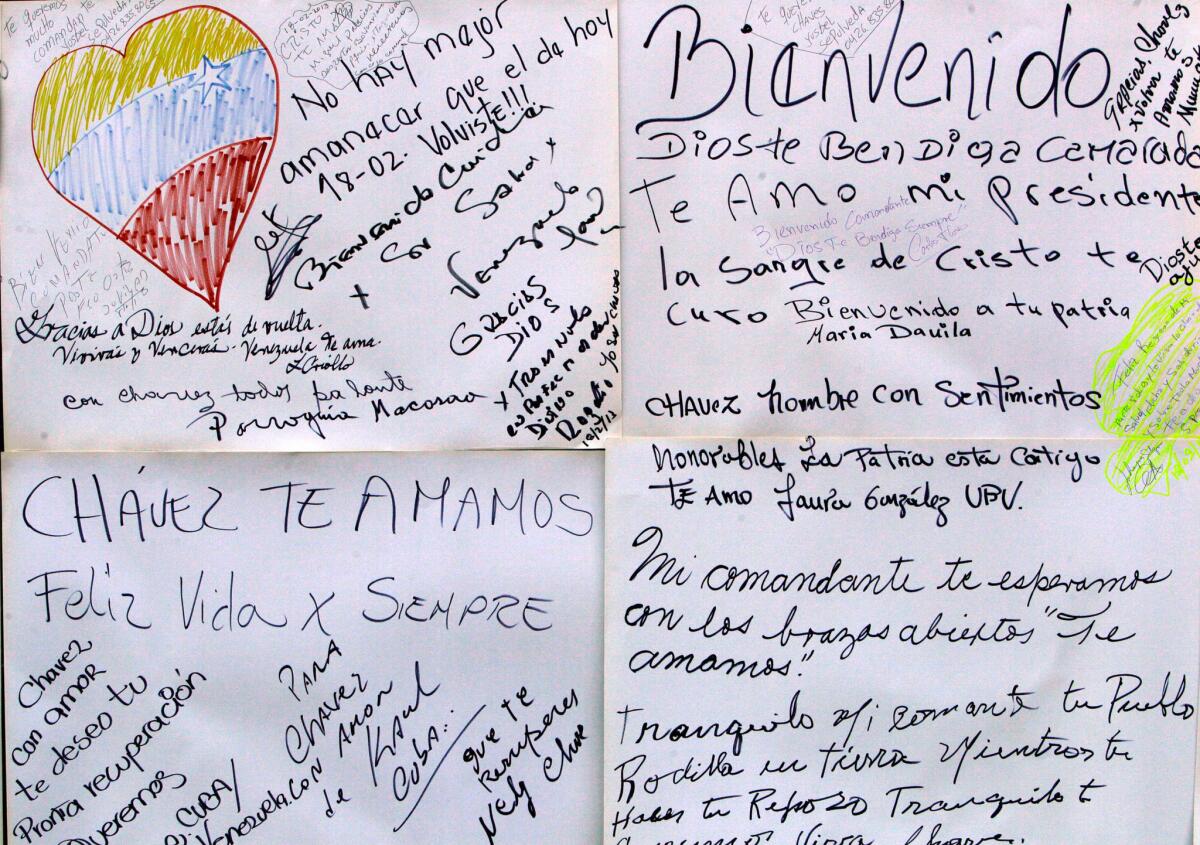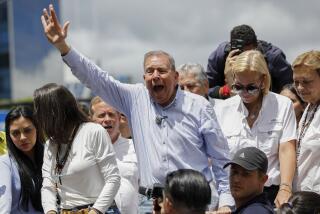Chavez return may increase pressure for new election

CARACAS, Venezuela -- President Hugo Chavez’s return to Venezuela after a 10-week absence while undergoing cancer treatment in Cuba answered questions about whether he was still alive and has gratified his supporters. But it may only add to pressure that an election be called to choose a successor.
Among the political factors at work, analysts said Monday, is the 46% devaluation of Venezuela’s currency ordered this month by Chavez’s designated political heir, Vice President Nicolas Maduro. The move could carry political costs in the long term that would make it expedient for Chavistas to hold quick elections if Chavez is too ill to govern.
Venezuela’s Constitution calls on the president of the National Assembly to hold new elections once an incumbent resigns or is deemed unfit to hold office. With Chavez battling cancer for which he has undergone four surgeries, that determination may not be far off.
PHOTOS: Hugo Chavez returns to Venezuela
As a result of the devaluation, Venezuelans’ real income may decline by 20% and inflation could rise 30% this year -- economic fallout that will hurt the poor, Chavez’s core supporters, the most because they spend a higher portion of their income on imported food, said Francisco Monaldi, visiting professor at Harvard’s Kennedy School of Government.
“The popularity of the government could fall at least 5 percentage points in the next few months” because of the devaluation, Monaldi said, adding that Chavez’s lieutenants should try to hold elections “very fast” before the full impact of the weaker currency is felt.
Chavez arrived in the capital early Monday morning and was admitted to a military hospital in the poor San Martin barrio in west Caracas. There were no photos of his arrival; the only ones released since his most recent surgery in Cuba in December were made public Friday.
Hundreds of Chavez supporters gathered Monday in the historic center of Caracas, the capital, and near the military hospital in shows of support. The government is said to be organizing massive demonstrations to be held later this week.
Maduro visited Chavez at the hospital Monday afternoon and told reporters afterward that the Venezuelan leader was “well and stable” and being taken care of like “any hospital patient.”
But Eric Farnsworth, vice president of the Washington office of the Americas Society, said Chavez’s return doesn’t diminish the “constitutional crisis” that is gripping Venezuela, in light of the president’s absence from government and his questionable constitutionality of designating Maduro as his successor.
“His incapacitation and his designation of the uninaugurated Maduro to run things in his absence has been a pretty clear interruption of constitutional democracy,” Farnsworth said.
As far as Chavez’s health is concerned, Farnsworth noted that his return “in the dead of night rather than the celebratory welcome at the airport that would otherwise have been expected is revealing.”
Chavez’s return, despite the appearance that he has not fully recovered from surgery, may have been a response to increasing pressure from opposition groups. On Monday, students spent a fifth day at the Cuban Embassy in Caracas in protests originally called over Chavez’s absence.
“Let’s hope the country will begin to learn some things, that some truth will be spoken and time and energy will be dedicated to things that are really important,” said Henrique Capriles, the Miranda state governor defeated by Chavez in October elections. Capriles may end up becoming the opposition candidate in a new election pitting him against a Chavista opponent.
Jose Manuel Puente, an economist at the Institute of Advanced Management Studies in Caracas, said this month’s devaluation of the bolivar is the fifth such adjustment in the past decade and is evidence of the government’s “poor exchange rate and macroeconomic management.” The impact falls greatest on “the most humble, who dedicate a higher portion of their income” to food and household goods, he said.
ALSO:
U.N. panel finds conflict in Syria ‘increasingly sectarian’
Hugo Chavez’s return ends 10-week absence from Venezuela
Nigeria extremists claim responsibility for kidnapping 7 foreigners
Mogollon reported from Caracas and Kraul from Barra de Navidad, Mexico.
More to Read
Sign up for Essential California
The most important California stories and recommendations in your inbox every morning.
You may occasionally receive promotional content from the Los Angeles Times.










